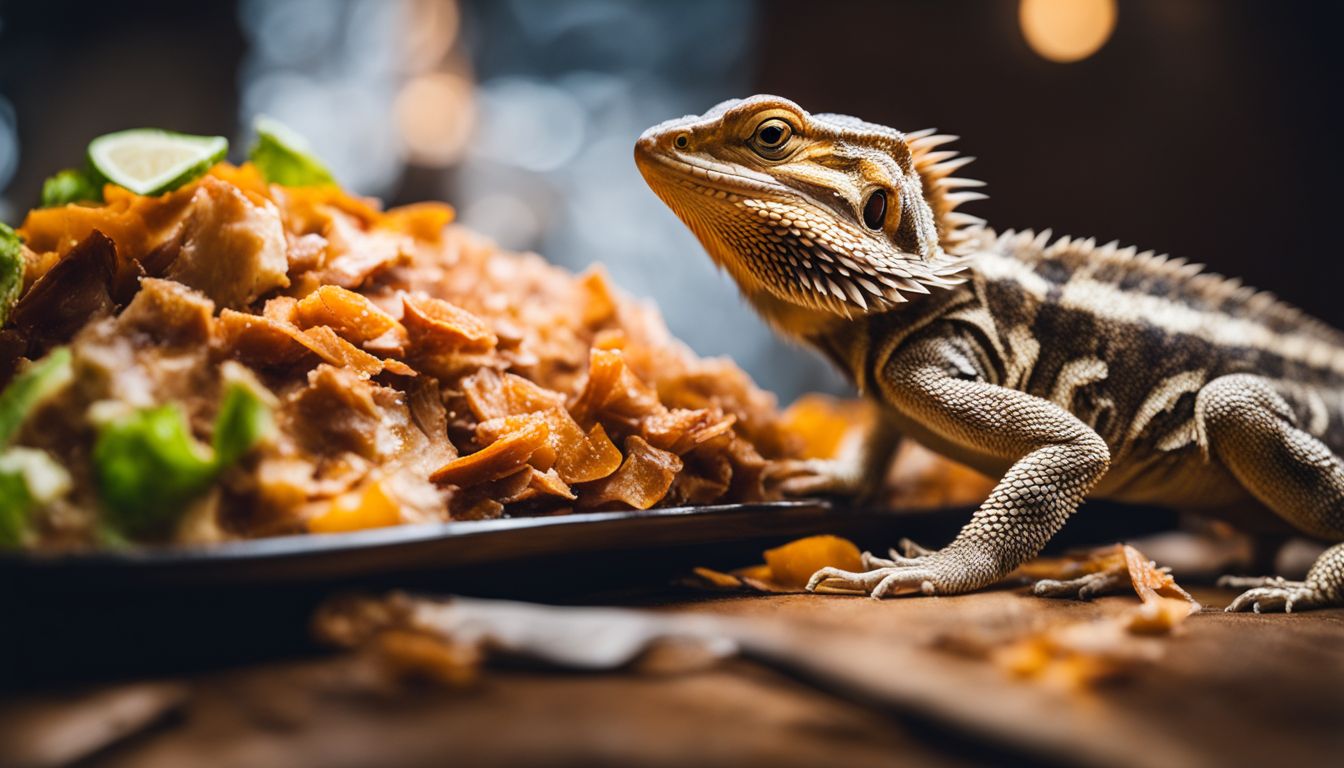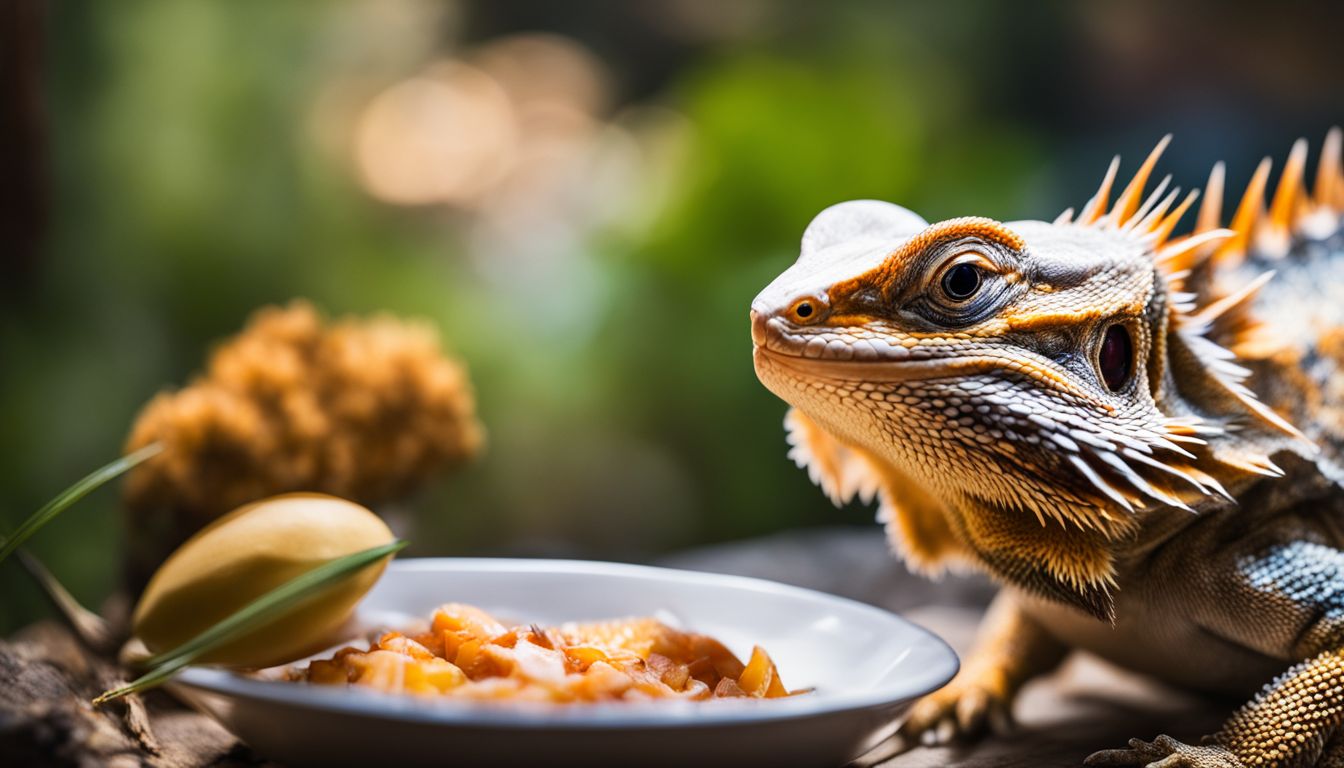Are you wondering if your bearded dragon can enjoy a bit of turkey? Well, the good news is that bearded dragons can indeed eat cooked turkey as part of their diet. This blog post will guide you through the benefits and how to safely introduce turkey into their meal plan.
Keep reading to ensure your scaly friend enjoys a healthy and varied diet!
Can Bearded Dragons Eat Turkey?

Bearded dragons can eat turkey, but it should be given in moderation and as an occasional treat. Turkey provides a good source of protein for these reptiles, but it should always be cooked and served without any seasoning or bones.
Understanding the Benefits and Risks
Feeding cooked turkey to bearded dragons can add variety to their diet and provide them with essential nutrients. Turkey, being a source of lean protein, supports muscle health in these reptiles.
However, it’s critical to serve it as part of a balanced meal plan. This ensures that your bearded dragon gets all the necessary vitamins and minerals for optimal health.
On the flip side, there are significant risks associated with turkey consumption in bearded dragons. The high protein content can strain their digestive system if given in large amounts or too frequently.
Moreover, turkey has high phosphate levels which could disrupt the calcium balance in your pet’s body leading to potential renal problems. Always proceed with caution and consult a vet before including new foods like turkey into your dragon’s dietary routine.
Vet-Approved Dietary Facts
Navigating the dietary needs of bearded dragons can often feel like a complex puzzle, especially when considering the inclusion of meats like turkey in their diet. To simplify this, let’s dive into some vet-approved dietary facts, presented in a clear, table format. These insights aim to provide you with a solid foundation on the benefits and risks associated with feeding turkey to your bearded dragon, ensuring you make informed decisions for their well-being.
| Fact | Detail |
|---|---|
| Protein Source | Bearded dragons can eat turkey as it serves as a good protein source. |
| Nutritional Considerations | It’s essential to ensure the turkey is plain, cooked, and free from any seasonings or additives that can harm your bearded dragon. |
| Serving Size | Turkey should only be a small part of the diet, supplementing their primary intake of vegetables and fruits. |
| Safety Concerns | Raw meat, including turkey, is debated due to potential bacteria and parasites; cooking it eliminates these risks. |
| Other Meats | While turkey is acceptable, lean meats like cooked chicken and lean steak can also be included in moderation. |
| Dietary Variety | A balanced diet for a bearded dragon also includes insects, vegetables, and occasional fruits, not just meat. |
Understanding these vet-approved dietary facts is crucial for anyone looking to include turkey in their bearded dragon’s diet. Remember, while turkey can be a source of protein, it should not overshadow the importance of a varied diet rich in vegetables and appropriate insects. Always ensure that meats are cooked and served plain, avoiding the temptation to share your seasoned turkey dinner with your scaly friend. By sticking to these guidelines, you can help maintain your bearded dragon’s health and happiness.
Preparing Turkey for Bearded Dragons

Preparing turkey for bearded dragons requires careful attention to make it a safe treat. It’s important to follow these steps closely:
- Choose lean turkey – Opt for the leanest parts of the turkey. These contain less fat, making them a healthier choice for your reptile friend.
- Cook thoroughly – Raw meat can harbor harmful bacteria. Ensure the turkey is cooked well to kill any potential pathogens that might harm your bearded dragon.
- No seasonings – Bearded dragons have sensitive stomachs. Cooking the turkey without any added spices, salt, or sauces keeps it safe for them to eat.
- Cut into small pieces – Once cooked and cooled, chop the turkey into tiny pieces. This makes it easier for bearded dragons to eat and digest.
- Offer in moderation – Given its high protein and phosphate content, turkey should only be given as an occasional treat, not a regular part of their diet.
- Watch for reactions – After feeding your bearded dragon turkey for the first time, observe them closely. If they show any signs of discomfort or illness, consult a vet immediately.
- Dispose of leftovers safely – Don’t leave uneaten turkey in the enclosure too long to avoid attracting flies or bacteria growth. Remove and dispose of it properly after your bearded dragon has finished eating.
- Rinse with water – Always ensure fresh water is available for your bearded dragon after they’ve eaten turkey to help them digest this protein source effectively.
The Right Amount of Turkey for Bearded Dragons
When it comes to serving turkey to your bearded dragon, moderation is key. The right amount of cooked turkey should only be given occasionally as a treat, not as a staple in their diet.
Due to its limited nutritional value and high protein content, it’s best to offer leaner meats like cooked chicken or insects for their primary source of protein. Remember that a balanced diet for your bearded dragon includes varied food types to meet their dietary needs and maintain good health.
The Right Amount of Turkey for Bearded Dragons can impact the balance needed in their diets.. Ensure variety by offering leaner meat options on occasion instead.
Other Types of Meat Bearded Dragons Can Eat
Bearded dragons can also eat cooked chicken and lean steak – ensure to learn how to prepare these meat types for your pet! Read more about offering a variety of protein sources for bearded dragons in the next section.
Cooked Chicken
Cooked chicken is not safe for bearded dragons. It’s challenging for them to digest, making it an unsuitable protein source. When choosing food for your reptile pet, opt for options that are easier on their digestive system and provide essential nutrients without causing discomfort.
Stick to vet-approved dietary facts and avoid cooked foods like chicken that can pose digestion problems.
Lean Steak
Bearded dragons can have lean steak as a source of emergency protein. It should be cooked and unseasoned, just like turkey or chicken. However, lean steak is not a regular part of their diet.
As an alternative protein in specific situations, cooked lean meat – including steak – offers variety. This food diversity helps maintain balanced nutrition for your beardie’s well-being.
Foods to Avoid Feeding Bearded Dragons
Avoid feeding bearded dragons chocolate or avocados—these foods are toxic to them. For more important guidelines on what not to feed your pet reptile, read on..
Highlight on Why Bearded Dragons Cannot Eat Chocolate
Bearded dragons should never consume chocolate because it is harmful to their health. Chocolate contains theobromine and caffeine, which can be toxic for these reptiles, leading to vomiting, diarrhea, increased heart rate, tremors, seizures, and even death.
It’s crucial to remember that when feeding your bearded dragon, foods such as chocolate must always be avoided due to the severe health risks it poses.
The Importance of a Balanced Diet for Bearded Dragons
Bearded dragons require a balanced diet rich in nutrients for their overall well-being and growth. A balanced diet consists of 80% plants and 20% insects for adult dragons, ensuring they get essential vitamins and minerals.
The proper combination of live insects, leafy greens, and occasional fruits is crucial to maintain their health. Additionally, calcium supplements are vital to prevent metabolic bone disease in bearded dragons.
Moreover, a balanced diet supports the digestive system and boosts immunity against diseases commonly found in captive reptiles. By incorporating dietary variety and adhering to a feeding schedule, bearded dragon owners can ensure that their pets receive optimal nutrition for thriving health.
Offering gut-loaded insects further enhances the nutrient intake for these reptiles without needing extra supplementation.
Better Food Alternatives for Bearded Dragons
Bearded dragons can benefit from a variety of nutritious food options. Providing a balanced diet is essential for their health and well-being. Here are some better food alternatives for bearded dragons:
- Insects such as crickets, dubia roaches, and black soldier fly larvae are excellent protein sources.
- Dark leafy greens like collard greens, mustard greens, and dandelion greens provide essential vitamins and minerals.
- Vegetables including bell peppers, squash, and carrots offer additional nutrients and hydration.
- Fruits like berries, melons, and bananas can be given as occasional treats due to their natural sugars.
- In small amounts, cooked eggs serve as an excellent source of protein for bearded dragons.
- Commercially prepared beardie pellets can supplement their diet with essential vitamins and minerals.
- Gut – loaded insects provide an extra nutritional boost for bearded dragons when fed to them.
- Variety is key; offering a combination of these foods will help ensure a well – rounded diet for your pet reptile.
Conclusion
In conclusion, cooked turkey can be a part of a balanced diet for bearded dragons. It should be fed in moderation and as an occasional protein source. Consulting with a veterinarian is essential before introducing any new food to your pet’s diet.
Other lean meats like chicken and beef can also provide alternative sources of protein for your beardie. Always prioritize the overall nutritional needs of your bearded dragon for their health and well-being.
For more detailed information on why chocolate is a dangerous food for bearded dragons, please visit our comprehensive guide here.
FAQs
1. Can bearded dragons eat turkey?
Yes, bearded dragons can eat cooked turkey as an occasional treat.
2. Is it safe to feed my bearded dragon leftover Thanksgiving turkey?
Leftover Thanksgiving turkey should not be fed to your bearded dragon due to seasoning and potential bones. Stick to plain, cooked turkey without seasoning or skin.
3. What are the risks of feeding my bearded dragon too much turkey?
Feeding excessive amounts of turkey can lead to digestive issues for your bearded dragon, so moderation is key.
4. Should I include organs like liver or gizzards when feeding my bearded dragon turkey?
Avoid including organs like liver or gizzards when feeding your bearded dragon, as these parts may contain high levels of certain nutrients that could harm them in large quantities.
5. How often can I offer a small amount of cooked turkey to my pet lizard?
You can offer a small amount of cooked turkey to your pet lizard once in a while as part of a varied diet but not as their primary food source.




